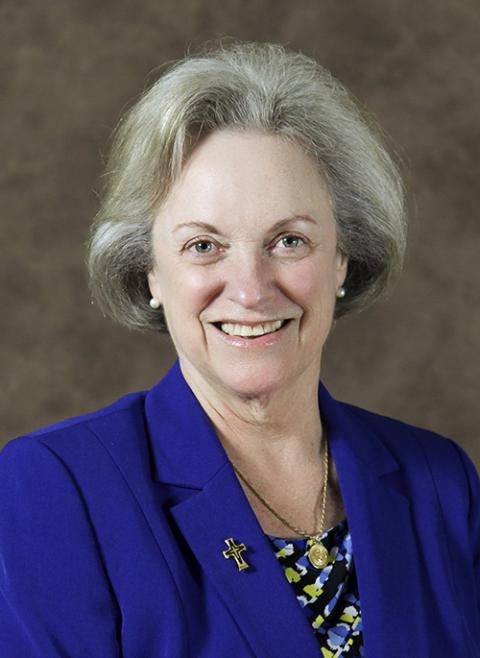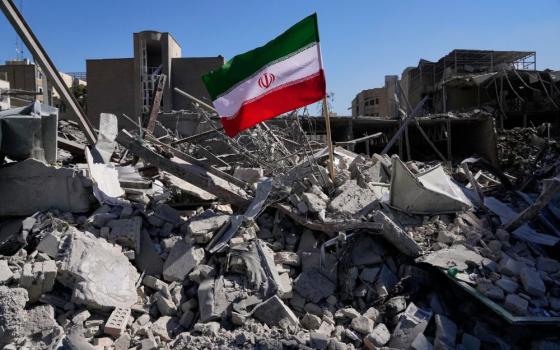
A U.S. dollar bill and medicines are seen in this illustration, taken June 27, 2024. (OSV News/Reuters/Dado Ruvic)
If the United States Congress continues with its plan to cut spending on Medicaid by more than $800 billion over the next 10 years, critics say nearly 11 million people will lose their health insurance.
More than 13,000 of those could be men and women religious.
As Global Sisters Report reported in 2018, if Medicaid coverage were to end for women and men religious, congregations would have to pay an estimated $128 million in additional health care costs per year, according to GSR's analysis of statistics compiled by the National Religious Retirement Office.
But those numbers were calculated in 2018, when the average cost of skilled care for religious was about $63,500 a year. The National Religious Retirement Office, or NRRO, reports the average cost of skilled care for its religious members in 2024 was $90,761, which means losing Medicaid for their members could cost religious congregations almost $200 million per year in new health care costs for skilled care.
Losing Medicaid for their members could cost religious congregations almost $200 million per year in new health care costs for skilled care.
Medicaid is a federal- and state-funded insurance program for those with low incomes; religious often qualify because they take a vow of poverty.
"This will be a game changer if this happens," said St. Joseph Sr. Mary Pellegrino, a former president of the Leadership Conference of Women Religious and now a senior vice president at Plante Moran Realpoint, where she specializes in consulting with religious congregations on their finances and real estate. "People are really on pins and needles about this."
A 2016 study commissioned by the NRRO found that, by 2034, congregations of religious men and women will be about $9.8 billion short of what they need to care for retired members. Cuts to programs like Medicaid could add billions to that amount.
Surveys of NRRO members found that as of 2024, about 62% of congregations have 60% or less of the funding they need for retirement; less than 6% are adequately funded. Since NRRO members only account for about 58% of religious in the U.S., the actual numbers could be much higher.
"Any cuts to Medicaid would only add to an already serious problem," said NRRO director John Knutsen in an email. "The impact would vary depending on a particular institute's level of retirement funding, but … we can expect that any significant cuts to Medicaid would make things more difficult for many religious institutes in the US."

Mercy Sr. Sharon Euart, a canon lawyer and executive director of the Resource Center for Religious Institutes in the U.S., is pictured in an undated photo. (CNS/Courtesy of Sharon Euart)
Mercy Sr. Sharon Euart, executive director of the Resource Center for Religious Institutes, said that if congregations lose Medicaid coverage for their members, they will be forced to make hard decisions about how to care for older sisters, priests and brothers.
"The financial burden would be great," Euart told GSR.
So great, she said, that the trend of congregations selling land, buildings and other assets would accelerate, as some that hadn't contemplated it before would be forced to consider their options, and those already thinking about it would be forced to move sooner. More congregations would have to look at options such as sharing a long-term care facility with another congregation or congregations, or living in a facility with laypeople.
"There is no single response for how to care for members and reduce the costs for retirement," Euart wrote. "Such cuts would seriously affect the ability of religious communities to care for their elderly members."
Even worse, Euart said, is that congregations would have to direct resources away from their mission toward caring for elderly members. Hospitals or health systems may have to be sold to pay for members' health care. Many congregations have already done that in recent decades, she said, and cutting Medicaid could force more to consider it; congregations that run nursing homes may no longer be able to afford to do so.
Pellegrino said communities already spend valuable resources on staff members to handle insurance for their members, and the additional paperwork proposed by the legislation in Congress would add to that burden. While that will hurt religious, she said, laypeople on Medicaid have no staff at all to help them, and many expected to lose coverage, critics have said, will do so because of the new paperwork requirements to prove their eligibility.
"It's complicated now," she said. "So think about the elders in the broader community, or people who are disabled, anyone who has to manage that amount of paperwork just to say 'my circumstances haven't changed.' "
Critics of the bill have said the proposal could force the closure of 338 rural hospitals — places where people are less likely to have health insurance and less likely to have access to any other health care options.
Advertisement
In a press briefing June 17 hosted by the Catholic Health Association, the CEO of CommonSpirit Health, Wright Lassiter III, said 29 of its 157 hospitals are designated "critical access hospitals" because they are the only health care option for many people. But the cuts would cost CommonSpirit $85 million a year, endangering those hospitals and its nearly 2,500 clinics and medical offices in 24 states.
"It's not just about hospitals or budgets — it's about real people," Lassiter said. "What happens when someone can't work or care for their family because of untreated hypertension, diabetes, or a preventable stroke? We already face maternal care deserts, including in many communities we serve. Proposed cuts will make that even worse."
Fifty-six percent of the babies CommonSpirit delivers are covered by Medicaid, he said.
Brad Coffey, president of Covenant Health Foundation, said during the briefing that innovative programs that prevent health problems or help patients manage them would have to be cut, because they are un-reimbursed and health systems would not be able to afford them.
"Our hospitals typically operate at a loss or barely break even," Coffey said. "This means less money to pay living wages for our staff, less money to replace equipment, less money to ensure adequate staffing, a reduction in the quality of care for an aging population, and a reduction in access."
Pellegrino said religious are typically reluctant to advocate for themselves, but so many people believe retirement and health care are funded by the Catholic Church that they may support the legislation without ever contemplating how it would hurt sisters, priests and brothers.
"There's such a misconception about the resources congregations have," she said. "I think many people are dumbfounded sisters rely on Medicaid."
'There's such a misconception about the resources congregations have. I think many people are dumbfounded sisters rely on Medicaid.'
—St. Joseph Sr. Mary Pellegrino
Knutsen said religious depend on programs such as Medicaid more than ever.
"Canon law stipulates that religious communities are financially responsible for the care of their own members, so any loss of Medicaid benefits would certainly increase the pressure many already feel with regard to caring for their senior members," he wrote. "A growing number of religious institutes have been moving elderly members from private healthcare plans to public programs like Medicaid in recent years, so any cuts would certainly have a serious impact on them."
Mercy Sr. Mary Haddad, Catholic Health Association president and chief executive officer, is pictured in an Oct. 10, 2016, photo. (CNS/courtesy CHA)
Mercy Sr. Mary Haddad, president and CEO of the Catholic Health Association, said in the press briefing the proposals cannot be justified.
"The bill unconscionably deepens Medicaid cuts, which will only result in more people losing coverage, more facilities struggling to stay open, and more patients unable to receive the life-saving care they so desperately need," Haddad said. "The bill would harm critical health and social safety net programs that millions of Americans rely on to live with health, dignity and security."
Pellegrino said it is even worse because of why the cuts are being made: to help pay for tax cuts for the wealthiest Americans.
"I can safely say that the amount of wealth that this bill transfers away from the least resourced in our society, I find that immoral," she said. "There's real danger to continue to erode our humanity."






